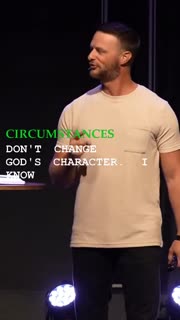Faith and Trust in the Midst of Suffering
Devotional
Sermon Summary
Bible Study Guide
Sermon Clips
1. "If you went home today and you went to bed tonight and everything was fine, and you woke up tomorrow morning, and you had nothing, your family's gone, you lose your house, your job is gone, your finances are gone, your friends are gone, your health is gone, you went to bed last night, you have everything, your family, your kids, your wife, your house, your car, your job, your money, your health, everything's good, but you woke up tomorrow and all of it, gone. It's not coming back. It's just you now. Wife is disappearing. Kids have passed away. House has burnt down. Car is out of here. Your finances, your bank account is at zero. You got nothing left. How would you respond?" [01:43] (61 seconds)
2. "Trust is revealed in trouble. Because here's the truth, it's easy to trust when it's good. But when trouble hits, that's when we really know the depth of our trust. The depth of our trust in others, the depth of our trust in God, and the book of Job is all about trouble reveals trust. And so we're going to look at the book of Job today, and we're going to go, hey God, what are you saying to me? What do I need to grab out of this?" [04:04] (27 seconds)
3. "It shouldn't be that I read the Bible to affirm my life, but I change my life to affirm the Bible. Because how I see it is the lens that I'm reading it through, and it's for all these things, so that the man or woman of God may be adequate, equipped for every good work. It's so that we can live this life in response to the goodness of God." [05:33] (24 seconds)
4. "No matter what happens to me no matter where I am in life no matter what I do my redeemer, the Messiah, Yahweh Jesus, he lives. And he lives forever and he will stand on this earth again and he will take his final stand long after my flesh has decayed, long after my life is over, long after my circumstances have changed, Jesus remains. Jesus stands and here's what I want to tell you today that even in the midst of maybe a Job season as we go through the book that you may be living through or whatever I need you to hear me. Your redeemer lives." [09:13] (35 seconds)
5. "If I see Jesus as nothing more than a get out of hell free card, I'll never give, I'll never serve, I'll never worship, I'll never pray except when things are good. I'll never tell another person about him. Because after all, he's only about me helping me get to hell, heaven, and out of hell. But when I see Jesus as the king of kings, and the Lord of lords, and the savior of the universe, and the one who stood after he conquered death, hell, and the grave, and he held the keys, now I worship. Now I pray. Now I invite people to church. Now I tell the waitress how good he is. Why? Because what I believe about him dictates how I live with him. It changes everything." [23:22] (49 seconds)
6. "Circumstances don't change God's character. I know what you're going through is the worst thing anybody on the history of the world has ever gone through, ever, in the history of life. I understand. But God's still the same. God still stands. God still reigns. God still loves. God still forgives. God still cares. And just because it's difficult doesn't mean God's not there. Just because God's silent, as we'll find out in a minute, doesn't mean God's not there. Just because it's painful doesn't mean God doesn't care." [26:03] (33 seconds)
7. "Everything without God is actually nothing. But nothing including God is everything. Here's why. I can have everything in this life. I can have the boat, the car, the house. I can have the friends, the business, the wealth. I can have the stuff. I can have the things. I can have the reputation. I can have this. I can have that. And I can extract God. The one constant. Because all this will fade one day. But He stays the same yesterday, today, and forever. And if I take Him, the only constant, out of the equation, I really have nothing." [30:25] (42 seconds)
8. "There is no deliverance without devastation. There is no deliverance without difficulty. There is no restoration without retribution. It happens. They come in pairs. And oftentimes the devastation brings us to a place to where we're either going to be taken out or we're going to be brought closer in. And we want, hey God, deliver me. God, forgive me. However, God, I don't want to give up. God, save me of my sins and deliver me from hell. But don't you dare ask me to be generous. God, I need you to deliver my marriage. But don't you dare ask me to become a better spouse." [33:10] (46 seconds)
9. "God will restore. I know, I know the devastation makes us feel like there's no light at the end of the tunnel. But I'm here to tell you that no matter the devastation, no matter the difficulty, no matter the pain, the heartache, the hurt, the frustration, no matter what it is that you're going through in your life, I need you to hear me. God is a restorer and God will restore and God will deliver. I just have to get through the devastation. I just have to get through the debate and I have to keep my faith and I have to know that nothing around me changes who he is within me." [40:12] (34 seconds)
Ask a question about this sermon
2. "Trust is revealed in trouble. Because here's the truth, it's easy to trust when it's good. But when trouble hits, that's when we really know the depth of our trust. The depth of our trust in others, the depth of our trust in God, and the book of Job is all about trouble reveals trust. And so we're going to look at the book of Job today, and we're going to go, hey God, what are you saying to me? What do I need to grab out of this?" [04:04] (27 seconds)
3. "It shouldn't be that I read the Bible to affirm my life, but I change my life to affirm the Bible. Because how I see it is the lens that I'm reading it through, and it's for all these things, so that the man or woman of God may be adequate, equipped for every good work. It's so that we can live this life in response to the goodness of God." [05:33] (24 seconds)
4. "No matter what happens to me no matter where I am in life no matter what I do my redeemer, the Messiah, Yahweh Jesus, he lives. And he lives forever and he will stand on this earth again and he will take his final stand long after my flesh has decayed, long after my life is over, long after my circumstances have changed, Jesus remains. Jesus stands and here's what I want to tell you today that even in the midst of maybe a Job season as we go through the book that you may be living through or whatever I need you to hear me. Your redeemer lives." [09:13] (35 seconds)
5. "If I see Jesus as nothing more than a get out of hell free card, I'll never give, I'll never serve, I'll never worship, I'll never pray except when things are good. I'll never tell another person about him. Because after all, he's only about me helping me get to hell, heaven, and out of hell. But when I see Jesus as the king of kings, and the Lord of lords, and the savior of the universe, and the one who stood after he conquered death, hell, and the grave, and he held the keys, now I worship. Now I pray. Now I invite people to church. Now I tell the waitress how good he is. Why? Because what I believe about him dictates how I live with him. It changes everything." [23:22] (49 seconds)
6. "Circumstances don't change God's character. I know what you're going through is the worst thing anybody on the history of the world has ever gone through, ever, in the history of life. I understand. But God's still the same. God still stands. God still reigns. God still loves. God still forgives. God still cares. And just because it's difficult doesn't mean God's not there. Just because God's silent, as we'll find out in a minute, doesn't mean God's not there. Just because it's painful doesn't mean God doesn't care." [26:03] (33 seconds)
7. "Everything without God is actually nothing. But nothing including God is everything. Here's why. I can have everything in this life. I can have the boat, the car, the house. I can have the friends, the business, the wealth. I can have the stuff. I can have the things. I can have the reputation. I can have this. I can have that. And I can extract God. The one constant. Because all this will fade one day. But He stays the same yesterday, today, and forever. And if I take Him, the only constant, out of the equation, I really have nothing." [30:25] (42 seconds)
8. "There is no deliverance without devastation. There is no deliverance without difficulty. There is no restoration without retribution. It happens. They come in pairs. And oftentimes the devastation brings us to a place to where we're either going to be taken out or we're going to be brought closer in. And we want, hey God, deliver me. God, forgive me. However, God, I don't want to give up. God, save me of my sins and deliver me from hell. But don't you dare ask me to be generous. God, I need you to deliver my marriage. But don't you dare ask me to become a better spouse." [33:10] (46 seconds)
9. "God will restore. I know, I know the devastation makes us feel like there's no light at the end of the tunnel. But I'm here to tell you that no matter the devastation, no matter the difficulty, no matter the pain, the heartache, the hurt, the frustration, no matter what it is that you're going through in your life, I need you to hear me. God is a restorer and God will restore and God will deliver. I just have to get through the devastation. I just have to get through the debate and I have to keep my faith and I have to know that nothing around me changes who he is within me." [40:12] (34 seconds)









